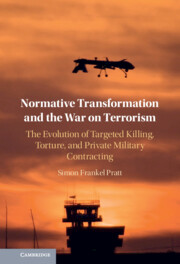 Normative Transformation and the War on Terrorism
Normative Transformation and the War on Terrorism 6 - Case 3
Private Military and Security Companies and the Prohibition on Mercenaries
Published online by Cambridge University Press: 06 January 2022
Summary
In Chapter 6 I investigate the increasing use of Private Security and Military Contractors as armed guards, mainly in the war zones of Afghanistan and Iraq, during the USA’s lengthy occupations there, but also elsewhere. I question whether this represents the erosion of international and domestic US prohibitions on mercenarism and find that it does not; as with the previous two cases, these prohibitions changed rather than disappeared. This process occurred as the US government incorporated armed contractors into its operational command and control structures, while the private firms themselves developed mechanisms of self-regulation through a code of conduct and a professional association. Communications technology played a major role in process at first, but then bureaucratic dynamics took precedence. The boundaries between public and private violence have shifted, but most recognisable forms of mercenarism remain prohibited.
- Type
- Chapter
- Information
- Normative Transformation and the War on TerrorismThe Evolution of Targeted Killing, Torture, and Private Military Contracting, pp. 120 - 154Publisher: Cambridge University PressPrint publication year: 2022
